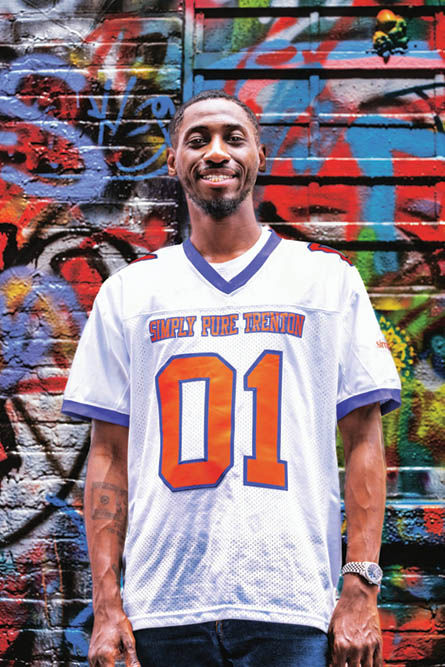It’s been six years since Tahir Johnson went all in on his dreams, trading a high-paying job with SunTrust Bank in Washington, D.C., to work as a part-time budtender in Upper Marlboro, Maryland.
The divine passion for Cannabis that walked Johnson into the industry has since given the 41-year-old wings stronger than your average Redhawk. Within four years of hustling, the Union High graduate became one of the first Black owners of an adult-use dispensary in New Jersey, opening the doors to Simply Pure Trenton in Ewing Township.
Ascending those ranks, he explained, took a tremendous amount of time and effort. He grew emotional reflecting on the trials and tribulations of his journey.
“I didn’t realize Cannabis was so hard,” said Johnson, his eyes welling as a tear strolled down his right cheek. “People assume that because you own a dispensary, you’re automatically making millions. But that’s just not the case. Sure, there are people out there who are doing it, and you can; it’s possible. But it doesn’t come easy. It takes a lot of time and a lot of hard work.”
Johnson returned home two decades after departing the state to attend one of the nation’s most prestigious historically Black colleges, Howard University in Washington, D.C., and making his mark in finance with big-time players like Morgan Stanley. His triumphant homecoming has been celebrated by a community mightily impacted by the war on drugs. In the decade prior to New Jersey’s Cannabis legalization in 2020, Black residents of Mercer County were 4.1 times more likely to be arrested, according to the American Civil Liberties Union. Much of the racial disparity stemmed from Cannabis-related arrests.
“I’m really proud to see the impact [Simply Pure Trenton] has had on my community,” said Johnson, who has been open about his own struggles with law enforcement, thrice arrested for possession of small amounts of Cannabis. “I’m reuniting with people I’ve known my whole life, even down to my kindergarten teacher. And then there’ll be times when complete strangers come up to me, and they’ll just start crying, happy to know that someone like me exists.”


Living up to such high expectations is a weight Johnson knows well.
“I accept that people find the things I’ve done inspirational,” he said, referencing an old Charles Barkley line about not being a role model. “I’ve had an opportunity not everyone gets to do, and I’m grateful. People might think I’m a celebrity or something, but really I just want to be a regular guy.”
In 2018, while still a financial advisor, Johnson applied for Cannabis licenses in Maryland and New Jersey. Subsequent rejections, he recalled, became a beautiful redirection that opened doors to the broader industry.
“In a way, I’m glad I didn’t get it then,” he said. “Because in the years between then and now, I had so much to learn about this industry. And I’ve made so many connections.”
As a part-time patient care specialist, Johnson used his free time to become an outspoken leader for diversity, equity and inclusion in the Cannabis industry. In addition to serving as a current council member for the MJBiz Conference, Johnson has volunteered with the National Cannabis Industry Association, the U.S. Cannabis Council and the Marijuana Policy Project. He also conducted 68 episodes of the podcast “Cannabis Diversity Report,” interviewing industry leaders on various topics from 2020 to 2024.
“I look at Cannabis as my contribution to the revolution,” Johnson said. “At my core, this is who I am. Growing up the way I did — between my parents and going to Afrikan People’s Action School Elementary — I was taught you lift up others as you climb. I idolized those Black civil rights leaders that were changemakers in our communities.”
Johnson is appreciative of a financial background that provides keen insight into an industry that remains at odds with its history.
“Cannabis is something that has been used as a tool to oppress my people,” he said. “It seemed like everybody I knew growing up has been arrested for weed at some point. But my white friends I’d smoke with at Union High — they didn’t experience that [reality].”
He’s committed to raising awareness and now holds the power to empower young African Americans by supplying jobs in the workforce. With New Jersey’s Cannabis market surpassing $1 billion in combined medicinal and recreational Cannabis sales in 2024 — a nearly 25% increase from the previous year, as reported by NJBiz — Johnson sees an opportunity to be part of the economic transformation. Over the next five years, he envisions expanding his operations to multiple dispensaries across several states.
“I want to be an example that we as Black people can be a part of this industry,” Johnson said. “I’m trying to help restore the justice part, and part of that is economic justice.”
simplypuretrenton.com | @simplypuretrenton | @simplytahir | @thecannabisdiversityreport









